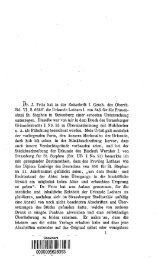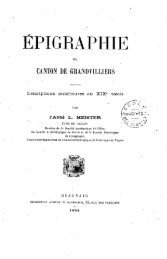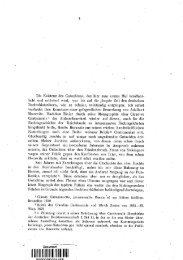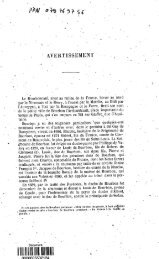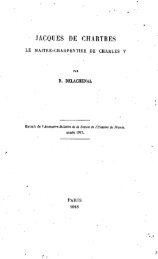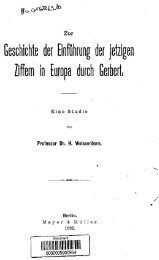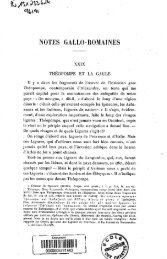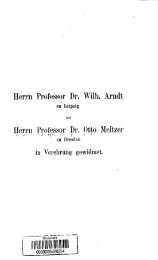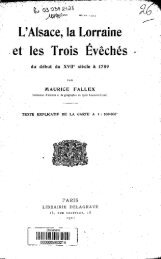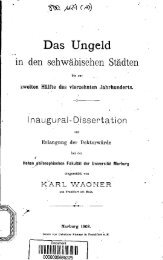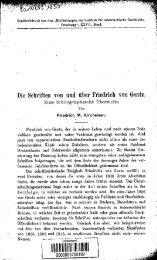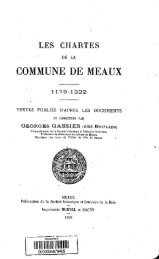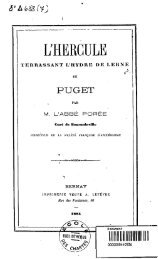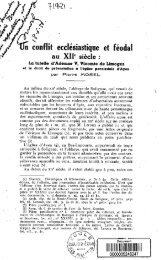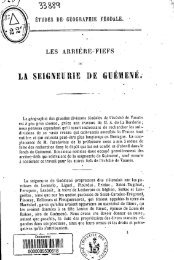4P Li gç(' TRANSACTIONS
4P Li gç(' TRANSACTIONS
4P Li gç(' TRANSACTIONS
Create successful ePaper yourself
Turn your PDF publications into a flip-book with our unique Google optimized e-Paper software.
798 LE k I \k F. I )E YCONO\1 IQ[E D'ARJSTOTE ITRANS. AMER. P1111.. SOC.<br />
I differs in beauty I ; vestemens dittenn dc antics en<br />
excellence tie heaute.'<br />
At the end of fol. 3411), Oresme struggled vainly with<br />
the text of all three versions. The reading of a is<br />
Propter quae oiuuia decet nuilto magis honorare virum<br />
et in verecundia 11011 hahere, si sacra puclicitia Ct OCS<br />
amniositatis films secundum 1-Terculeni non sequantur.<br />
[For all these reasons it is fitting that a woman should<br />
honor her husband far more nor he ashamed of him<br />
even when, as Hercules sa ys. 'hol y health of soul, and<br />
wealth, child of a brave spirit,' him.]" The<br />
gloss notes that 1' and c read Orphciun instead of Herciticiii,'<br />
but Oresme complains that the passage has been<br />
wrongly translated, appearing in all three versions in<br />
different readings, none of them translatable. Possibly<br />
he had difficult y with the confusing compound subject.<br />
with 0/n's in apposition With films and a plural verb<br />
serving as predicate to three dispersed subjects. I lis<br />
speculation that Orpheus wrote a 1)00k in which 11crcules<br />
is made to titter this poetic line is ingenious. but<br />
unwarranted ; Orpheus was indeed a legendary poet, to<br />
whom numerous verses were attributed, as in this iiistance.<br />
Had lie known this, Oresme would doubtless<br />
have chosen the reading of b and c in preference to a.<br />
However, the general sense of the original is preserved<br />
in time French.<br />
ii fol. 341d, a reads:" Quibus quid sanctius fieret?<br />
[What more hol y than this ?1 " ; b reads "Otiihus quid<br />
tlivuiius ? [What more divine than this? I ." Oresme<br />
straddles both reading ,.;: What more holy or more<br />
divine ? In the gloss he notes : "One text reads sanctiu.c<br />
and another dl'z'm)mmmrs.' Similarly, in fol. 343d Oresme<br />
translates si;nilia froin a, but gives in his gloss sinmmles<br />
from b, with a complete translation of the sentence using<br />
the latter reading. The choice is left to the reader.<br />
Oresoic appears at his critical best iii the gloss<br />
(342cd) in which he explains his preference for the<br />
reading of c. There are several variant readings at this<br />
point in the extant manuscripts and c corresponds closely<br />
with the marginal reading in Bud. Nat.. Ills. mt. 16089,<br />
which may have been among the Latin origmals from<br />
which Oresme worked. This manuscript is unique by<br />
reason of its marginal and interlinear corrections of a<br />
from both b and e. The reading servorum which<br />
Oresme corrects to suorunm is indicated in abbreviation<br />
in the margin. The gloss (346a) in which Oresnie<br />
seeks to correct the reading of a and b in order to satisfy<br />
his sense of propriety shows him in a far less favorable<br />
light. The sentence in question reads in a.' ''Nain cum<br />
Circe iacere noluit nisi propter anucorlifli salutem."<br />
The reading in b is : "Nee etiain cum Circe coire<br />
voluisset nisi pro amicorum salute." Both versions<br />
agree in substance: "The was unwilling to lie with Circe<br />
unless to secure the safet y of his companions.' Oresme<br />
translates: ''He was never willing to lie with a woman<br />
named Circe, even for the salvation of his friends."<br />
(,)ren:e '. l:tii:s that die texI. ire Corrupt and suggests<br />
that nisi (unless should read etiam (even'), although<br />
a, h, and c are uniform with nisi. lie justifies his<br />
tampering by citing Aristotle to the effect that one<br />
should never do evil iii order to accomplish good ; therefore.<br />
Aristotle would never have given his approval to<br />
Ul ysses' having committed a disloyal act against his<br />
wife Penelope, merel y to save his companions. Thus<br />
does Oresuie the theologian subdue Oresme the scholar.<br />
I lowever, we can applaud his disavowal of the magical<br />
po\'rs attributed to Circe ; his explanation of the transformation<br />
of Ul ysses' companions into animals shows a<br />
health y skepticism, if not absolute disbelief.<br />
In a gloss oil 347d. ()resnie cites a text containing<br />
the reading qmu v.cent (who shall Ii ye instead of q'u'i<br />
cerit ( who shall conquer). No extant manuscript<br />
gives the former reaching, a further proof that Oresme<br />
had at his disposal copies of the Economics which have<br />
since been lost.<br />
At the end of fol. 347(1 Oresmc attempts to explain<br />
variant readings of the garbled I .atin rendering of a<br />
(juotati 'in from Pindar. The original Greek, cited in<br />
full by Plato in the Republic I, 331a, means: "The old<br />
age ( of a good man) is cheered by a gentle companion<br />
who delights his heart; even by Hope herself, who<br />
bevotid ever ything else directs the capricious will of<br />
mortal men." \Vith minor variants, the Latin reads<br />
"ut Pindarus ait, tiulce enim sibi cur et spes iiiortahiutii<br />
niuhtiphicem voluntatem gubcrnat." Oresme.'s equivalent<br />
is:" And the hope of mortal mail many<br />
aspects of his will.' His gloss explains: ''Thus Pindar<br />
used to sa y . And this translates the reading of certain<br />
texts which have s/'es niortal'i'um, and the meaning is<br />
that the hope that people have in God governs their<br />
will. But other texts read s/n's unnmorfalimim, and this<br />
means that the hope that people have of obtaining illimortal<br />
rewards after death or the hope the y place in<br />
the immortal gods controls their will." The latter reading<br />
occurs iii time Parisian manuscript mentioned above<br />
and we ma y assume that other manuscripts now host<br />
read likewise. The important feature of the gloss is<br />
Oresme's mistaken acceptance of this reading and his<br />
derivation from it of his argument in favor of ''double<br />
felicity"—one for the body and title for the soul—a<br />
subject of frequent discussion ill theology.<br />
The gloss on Psalm 127: 2 to which he refers is, of<br />
course, from \Valafrid Straho's Glossaria ordinaria.<br />
In his final gloss (3481)) Oresme again complains<br />
that the Latin texts are corrupt, not without reason, if<br />
we read as lie did from a: ''I 'rol)ter qlae proprie et<br />
conuiiuniter decet iuste considerantes ad onines deos et<br />
hominess eum (flu z'rta;n lial'ef et multuni ad suani<br />
uxorem et flui is et parentes...As lie observes, con.<br />
qin vita;;: lmal'ef is not translatable ; however, b is clear<br />
at this point: ''Propter quae oportet specialiter et coinnnnmiter<br />
inste cogitalites ad onmnes cheos et homines<br />
vivere et multum ad suain uxorem et fmlios et pareiltes.<br />
Cf. \tirni. /','rr/ifi ii'ini 113: 1045.



